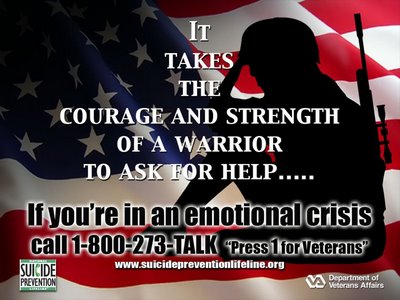
If you want to know why it is important to educate prosecutors about mental illnesses and to push for the creation of mental health courts consider the plight of Sean Duvall, a homeless Persian Gulf War veteran in Virginia.
When the 45 year-old Duvall sank into a depression last June, he considered ending his life. He wrote a suicide note to his family, put a letter confirming his eligibility to be buried in a veterans’ cemetery in his pocket, and made a homemade gun fashioned from a pipe.
But before he took his own life, he saw a telephone number for a Veterans Administration crisis line.
He called it and a counselor urged him to say put. Help was on the way. A police officer arrived and took Duvall to a psychiatric facility, where he was treated for depression and began feeling better.
This should have been a success story, especially since veterans are ending their lives at a rate of 18 per day.
Sadly, it isn’t.
Nine days later, Duvall was charged in a federal court with possessing a homemade gun and three other gun related charges that could land him in jail for forty years.
What makes these charges ironic is that they were filed by the U.S. attorney for the Western District of Virginia, Timothy Heaphy, who happens to be the son-in-law of Veterans Affairs Secretary Eric K. Shinseki, who is supposed to be our nation’s top veterans’ advocate.
In court documents, one of Heaphy’s assistants voiced a rationale that many of us have heard when someone we love with a mental disorder has broken a law.
“The law must be applied with equal force to all in this country…” the prosecutor wrote.
Really?
That sounds so noble. But as this case illustrates, sometimes charging a person with a crime when there are mitigating circumstances can be both counter-productive and cruel.
Much of the focus in Duvall’s case has been on the circumstances that led to his arrest. Should someone who calls a hotline be prosecuted for information that he provided in confidence? Was the “zip” gun that he made really that dangerous?
Prosecutors argue that federal laws allow a crisis line to “disclose information that is otherwise protected in compelling circumstances” such as “serious and imminent threats” to the caller or others. Prosecutors claim that Duvall waived any promise of confidentiality when he agreed to wait for a police officer.
Duvall’s defense attorney disagrees. Duvall thought his conversation was protected. Also, Duvall had placed a shotgun shell into an eight-inch long pipe. To make it fire, he planned to strike one end of it against a wall or nail or hard surface to ignite the firing pin in the shotgun sheel. The blast would have caused considerable damage to someone directly in front of it. But it was a crude device that Duvall had constructed to end his own life, not harm others.
To me these two issues — confidentiality and whether or not he had a lethal gun — are secondary issues.
So too, in my opinion, is the fact that he is a veteran and that he was wandering around the Virginia Tech campus, the site of the worst campus shooting in history by a student with a mental disorder.
The issue here is prosecutory discretion and education.
I know of several incidents where desperate parents have called the police for help when their adult son or daughter has become psychotic, but instead have watched their loved one be put in the back of a squad car under arrest for some minor crime. Over zealous prosecutors have demanded justice and persons, whose crimes were clearly linked to their mental disorders, have ended up with criminal records that have made it even harder for them to recover.
What U.S. Attorney Heaphy should have done is recognized that this was not a case worth pursuing and, if Heaphy felt compelled to file criminal charges, he should have found a way to have used his power to get Duvall into treatment, rather than wasting tax dollars to punish him. This is why mental health courts are so important. Their goal is NOT punishment. It is helping people get their lives back on track. (In addition to mental health courts, veterans courts also are springing up, especially since a recent Rand story estimated that 300,000 veterans have a mental illness.)
Since being charged, Duvall has managed to find work and rent an apartment. His attorney told reporters that Duvall doesn’t want to give interviews. He simply wants to move forward with his life.
Prosecutor Heaphy should let him.




Good stuff, Pete….keep up the good work! Sam
Sheesh!
This is really dreadful. I work in behavioral health at the VA and this crisis line is supposed to be a safe place to ask for help. This is so wrong on so many levels.